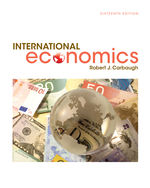The following is required:
The course is based on Robert J. Carbaugh’s International Economics, 16th Edition. Boston, MA: Cengage Learning. 2017.
The electronic textbook and access to MindTap can be purchased through the MindTap access instructions specific to your section, MBS, or online, using the ISBN of one of two options:
International Economics - MindTap Access (comes with e-book version): ISBN 13: 978-1-305-62920-2
International Economics (Looseleaf) - with Access: ISBN 13: 978-1-337-12742-4
Students will be using Cengage MindTap for this course. This is an online website that provides an interactive e-textbook as well as online homework assignments. NOTE: MindTap is NOT optional: the homework exercises make up 25% of the total course grade and it is where the textbook is located. There is a document available under handouts that explains how to access this course on MindTap.
The following is recommended:
A subscription to The Wall Street Journal.
Student subscription are available for 12 weeks at a very reasonable price at: https://buy.wsj.com/offers/pages/OfferMulti1a?trackCode=aaqiri15&page=us_imt3
